TBH stands for “to be honest” or, less commonly, “to be heard.” If you’ve seen people write TBH on social media, they were likely using it in place of the phrase “to be honest” at the beginning or end of their sentence.
When teens talk and text online, it can be hard to understand what they’re saying. Internet slang is constantly evolving and can feel like an entirely different language. As a parent, it’s important to learn these different terms not only to stay in the know but also to protect your kids from potential danger online.
The TBH meaning and other teen slang words may cause a headache for parents unfamiliar with them. Read on to discover the meaning of TBH and other slang terms and learn how to keep your kids safe online.
Table of Contents:
- How is TBH Used?
- Origins of TBH and Other Online Slang
- Internet Slang You Should Know: The Good and the Bad
- Potential Problems With Online Slang
- Online Slang: Tips for Parents
- FAQ
How is TBH Used?
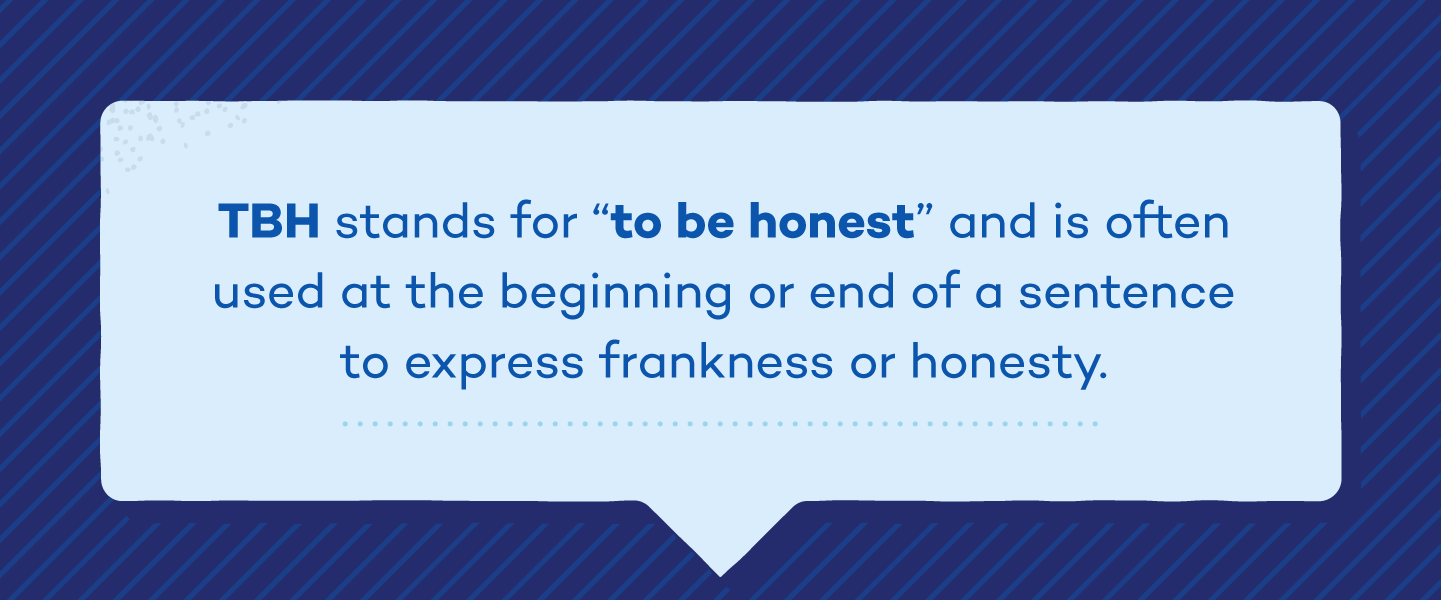
According to Google Trends, the first Urban Dictionary entry for TBH was added in the early 2000s, and the term quickly became popular by 2011. This term is normally used to channel a feeling of frankness or expressing honestly how you feel about a person or thing. If someone wants to be candid about an opinion, they could say, “TBH, I hate going to the mall.”
TBH is often used in texting or messaging on a variety of platforms, including Facebook, Instagram, Snapchat, X and WhatsApp, among others.
Positive Connotations
Like most online slang, TBH has evolved past its original meaning for some internet users. On Instagram, young people are now using it as a way to make new friends and connections or compliment one another. They do this by trading actions for “a TBH” as if it were a noun.
For example, a teen might post, “Like and comment for a TBH.” After a person has liked and commented, the original poster would go to one of their posts and comment something like, “TBH I love your outfit.” A TBH in exchange for a follow or like is almost always complimentary, and it’s a common way for teens to connect with friends and gain a quick confidence boost.
Here are a few more examples of how TBH can be used:
- TBH, I wasn’t really a fan of the movie.
- TBH, I don’t think I’m the best person for this project.
- TBH, I’ve been feeling overwhelmed lately. There’s just so much on my plate.
- TBH, I’m not sure if I can make it to the party tonight. I have a lot of work to catch up on.
- TBH, I’ve never really liked sushi. I just can’t get used to the taste.
- TBH, I think you’re making the wrong decision.
- TBH, I’m not a big fan of social media. It just feels like a waste of time to me.
- TBH, you’re one of the most genuine people I know.
Negative Connotations
TBH can also be used as a way to insult someone or, in contrast, give them a compliment. For example, you can say something positive to someone like, “TBH, you’re a kind and sincere person,” or insult them by saying, “TBH, I hate your taste in fashion.”
It’s important to note that the term isn’t inherently negative and can be used in a variety of ways depending on the context. A lot of the time, true intentions and meanings will elude parents, especially regarding their kids’ digital relationships. Parents may need to read between the lines and realize when seemingly innocent texting terms are used to convey negative thoughts.
Here are some examples of how TBH can have negative connotations:
- TBH, I don’t trust him. He seems shady.
- TBH, her constant complaining really gets on my nerves.
- TBH, I think he’s just using you for his own gain.
- I’m not sure if he’s capable of keeping his promises TBH.
Origins of TBH and Other Internet Slang
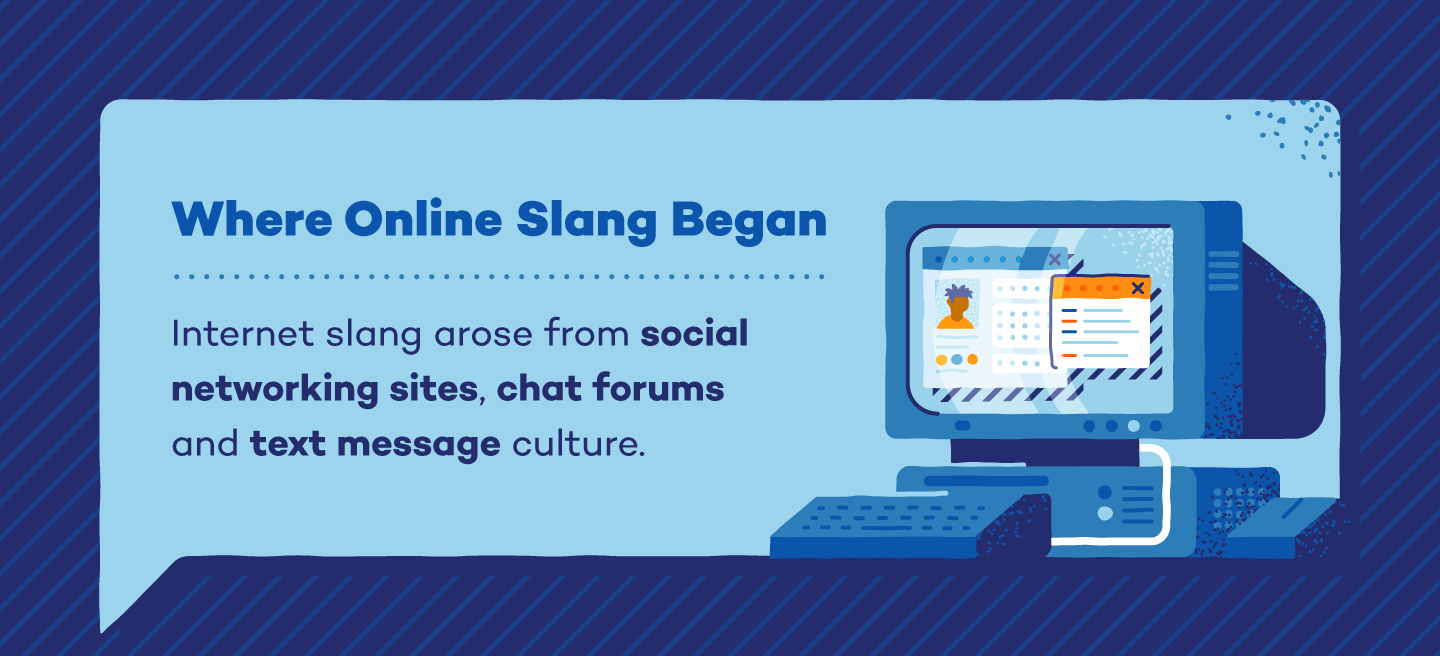
The origins of online slang are closely related to text message culture, social networking sites, gaming and online chats or forums.
Before smartphones and phones with keyboards were commonplace, people had to type out mobile messages using multi-tap texting, a method where each number key is connected to three or four letters. This method was not very efficient, and slow texting combined with character limits likely contributed to TBH and other abbreviations’ popularity online.
Slang has been around for many years, and each generation has its own style that sets it apart from others. However, moving this language into the digital space can create more opportunities for your kids to be in danger.
Pop culture is another element to keep in mind, as it heavily affects internet slag and how it spreads. Many of these terms are drawn from online memes and public figures like influencers, actors and musicians. There’s a social element that helps define and guide these slang terms, so it’s always a good idea to keep an eye on influencers and public figures your teenager likes to follow on Instagram, TikTok and other platforms.
Internet Slang You Should Know: The Good and Bad
There are many trendy slang terms that are becoming popular among teens. Keep reading to learn some popular slang words being used today and their meanings.
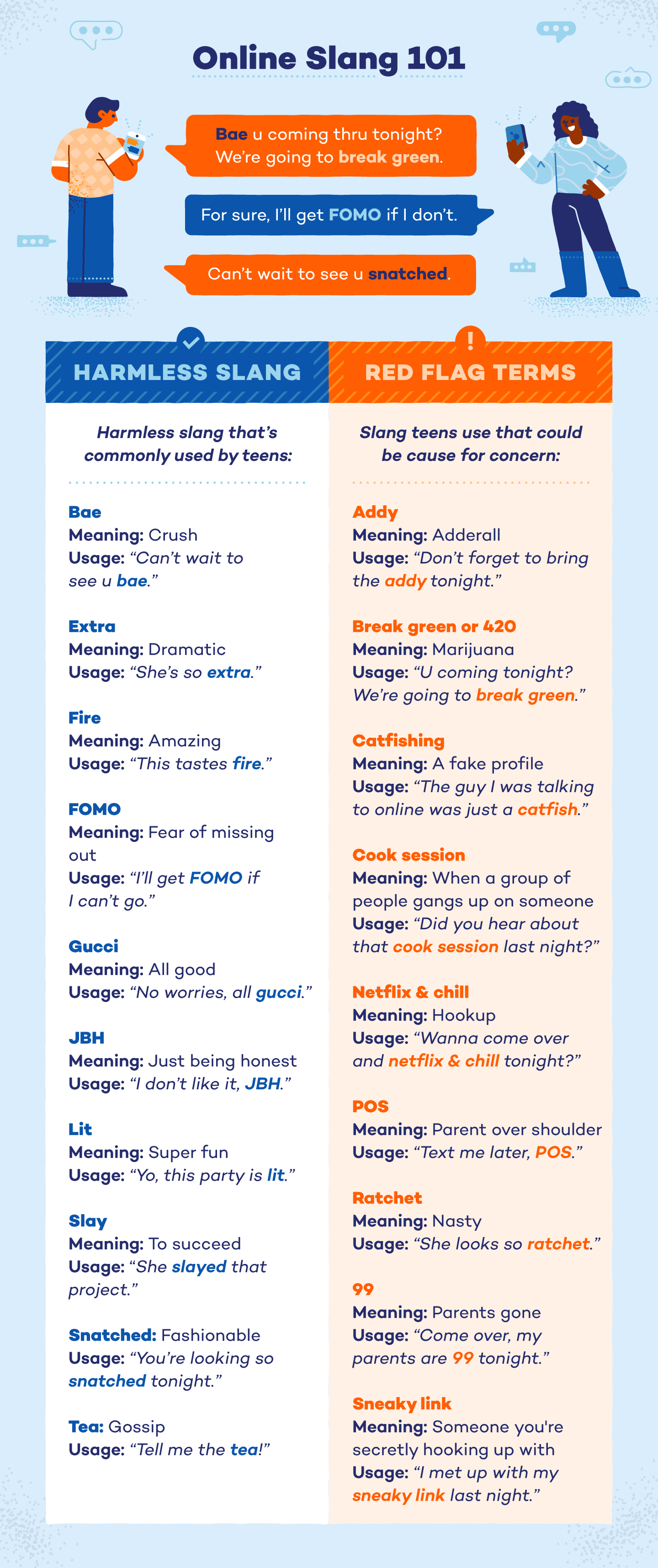
Popular Slang Terms to Watch Out For
TBH is just the tip of the iceberg as far as popular slang terms are concerned. Teens these days use a variety of abbreviations. While it’s not necessarily to keep their conversations private, it’s good to know what the following terms mean:
- Bae: “Before anyone else;” used as a term of endearment for a significant other or crush
- Bet: Can be used instead of “yes” or “OK,” or as a response to a challenge, like “we’ll see” or “watch me”
- Cap/No cap: “Cap” means to lie, whereas “no cap” means to be truthful
- Extra: Unnecessarily over-the-top and dramatic
- Fire: Really cool or amazing
- Fit: Short for “outfit”
- Flex: To flaunt, like knowingly flaunting your status
- FOMO: “Fear of missing out”
- Ghost: To purposely ignore someone
- Gucci: When something is cool or good
- JBH: “Just being honest”
- Lit: When something is high-energy, super fun, and exciting; can also mean drunk or high
- Lowkey: Expresses a feeling without too much intensity
- NGL: “Not gonna lie”
- Salty: This means you are bitter or mad toward something or someone
- Shade: Generally means that someone’s actions are sneaky or unsavory, like “throwing shade”
- Ship: Short for “relationship;” can also be used as a verb, like “I ship this couple”
- Slay: To be good at something or succeed
- Snatched: Refers to someone who is fashionable or looks really good
- Tea: Alternative phrase for gossip
Red Flag Slang Terms to Watch Out For
Most online slang teens use these days is harmless, but there are still a few bad apples floating around that you should be aware of. In high-risk situations online, teens may use slang to hide their mischievous or even dangerous behavior. Here are some red flag slang terms that are trending and you should watch out for:
- Addy: Short for Adderall, a medication that is used recreationally, normally intended to treat ADHD
- ASLP: Acronym for “age, sex, location, picture;” often used by online predators
- Break green or 420: This means to share marijuana with your friends or as a code for marijuana
- Catfishing: Using a fake social profile to pretend to be someone else
- Cook session: When a group of people gangs up on someone via social media.
- CU46: “See you for sex”
- Down in the DM: Usually meant to share or ask for nude photos through private messages on apps or to find a hookup
- FWB: “Friends with benefits”
- GNOC: “Get naked on camera”
- KMS: “Kill myself”
- KYS: “Kill yourself”
- Netflix and chill: A euphemism for a casual hookup; to meet under the pretense of watching TV together but actually just meeting for a hookup
- NP4NP: “Naked picture for naked picture”
- NSFW: “Not safe for work”
- POS: “Parent over shoulder”
- Ratchet: Usually describes someone as nasty, ugly, or awful
- Savage: Typically used to compliment a well-done insult; for example, someone who witnessed an insult could respond with “that was savage”
- #selfharmmm: A trending hashtag used on social media to identify or even glorify self-harming habits, such as cutting
- Sneaky link: Refers to someone you’re secretly having sex with
- Sugarpic: Erotic or suggestive picture
- Thirsty: To be desperate for something
- Xan/Xans/Xanny: Short for Xanax, a drug used to treat anxiety that is often used recreationally
- 53x: Sex
- 9: Code for “a parent is watching”
- 99: Code for “parents are gone”
Potential Problems With Online Slang
Cyberbullying is a widespread problem among teens (41% of internet users in the U.S. have experienced online harassment), and online slang could be contributing to the problem. Examples of cyberbullying include demeaning behavior, harassment, threats and embarrassing remarks toward another using an online platform.
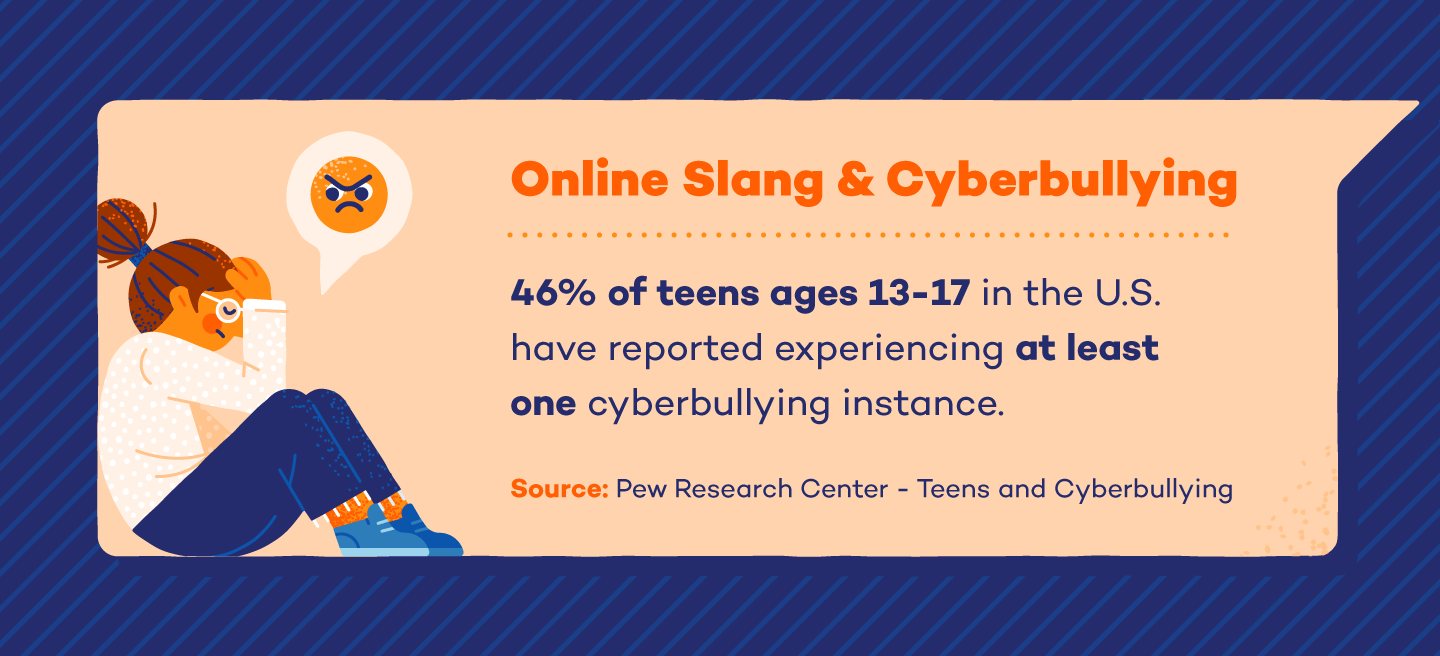
Cyberbullying
According to Pew Research Center, 46% of kids have reported that they were bullied online. Additionally, around 32% report being called offensive names during the experience. Many teens use hateful online slang terms, and young adults who experience this type of behavior are twice as likely to self-harm and display suicidal behavior.
It’s important to remember that while abbreviations and internet slang play a role in this phenomenon, it’s not really TBH’s fault.
Cyberbullying is an unfortunate reality for many children and teens — and social media and texting are at the forefront of these interactions. So long as parents remain in the loop and consistently make an effort to understand what and to whom their teens are communicating, they’ll be able to identify which slang terms spell trouble.
Online Predators
Online predators aren’t strangers to the internet when it comes to targeting teens. Predators such as drug dealers and sex offenders have found a way to adopt online lingo that teens are using today as a way to communicate and relate with them. According to a survey conducted by the Crimes Against Children Research Center, 15.6% of participants have experienced some form of online child sexual abuse before reaching 18 years of age.
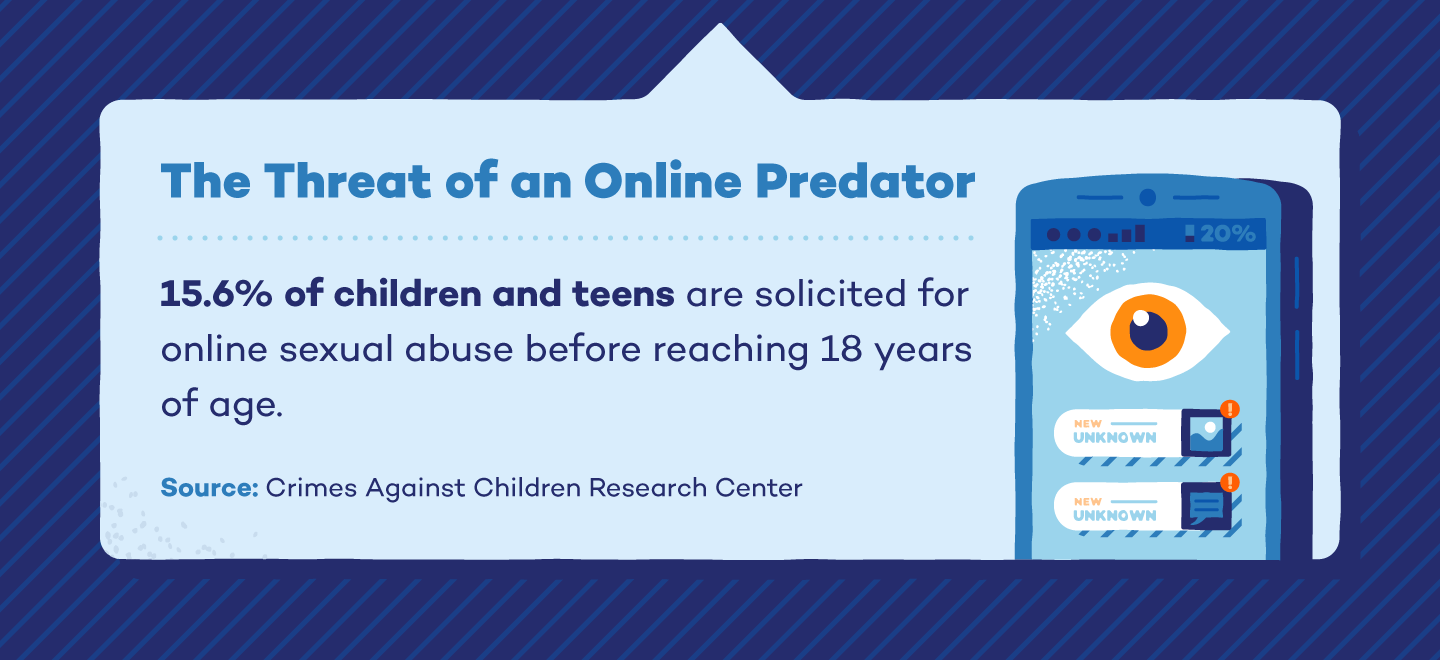
Online predators can use internet slang to communicate with your teen, so it’s important to be aware of the other internet slang terms that are being used today.
Internet slang is how your teen communicates with their peers. This is their chosen and preferred method of communication with people their age, and it’s a huge part of their social ritual or social acceptance. This makes their “language” a very valuable thing for an online predator to learn and use.
Internet Slang: Tips for Parents
Knowing that there’s potentially dangerous online language and that your teen could be hiding their activity may cause some concern. However, there are some helpful tips to know that will allow your kids to stay safe on the internet and keep your mind at ease:
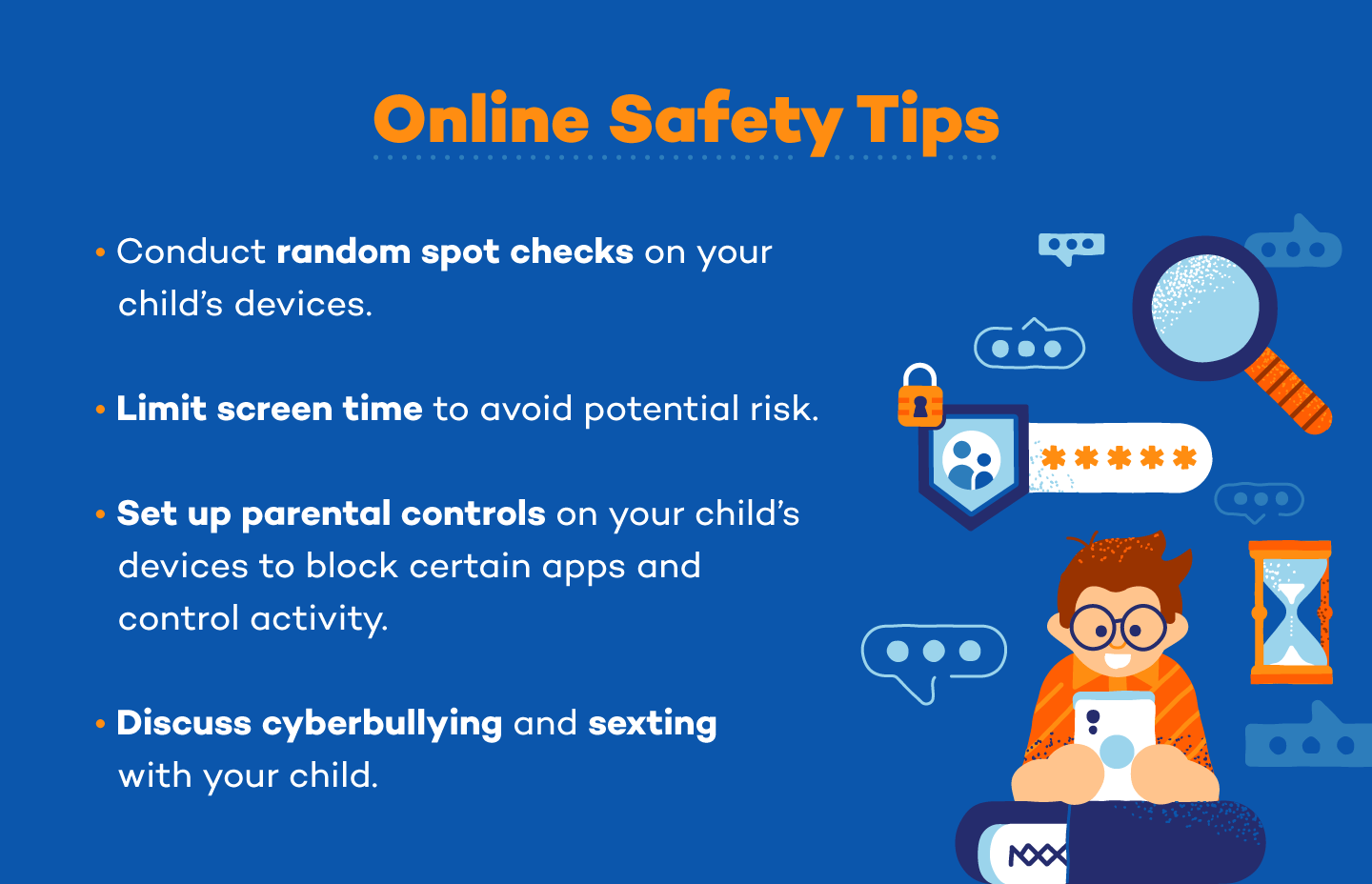
- Monitor devices: Conduct random spot checks on your child’s devices, the family PC, social media and instant messaging services.
- Discuss sexting: Make sure to talk with your teens about the dangers of sexting and its legal ramifications.
- Teach them: Don’t assume your kids know all about tech — teach them proper skills, tools and responsibilities if they run into trouble on the internet. This includes being proactive about letting their friends know what is and isn’t OK and being open to discussing problems that arise on the internet.
- Talk about online strangers: Stranger danger applies on the internet, too. Discuss the emotional and physical danger of communicating with someone you don’t know online, whether it’s instant messaging, talking on the phone or sending pictures or other information.
- Set up parental controls: Avoid any potential danger by setting up parental controls on your shared devices. These parental controls allow you to block or set time limits on internet usage.
- Limit screen time: Limiting the amount of time your teen spends on their devices allows for less risk and more time spent doing homework, spending time with family and getting a good night’s sleep. Less time online also means they won’t have time to get curious and start digging through the internet.
- Have conversations about cyberbullying: Cyberbullying is common in today’s online world, and it’s important to discuss how to deal with online threats and bullies and how to block or report them.
- Impose consequences: If your teen is the one causing mischief online, be sure to enforce consequences for their actions. This could include taking away their devices until they learn how to use them responsibly.
- Stay on top of internet terminology: Learn new internet slang by bookmarking sites like Urban Dictionary, Wiktionary and Urban Thesaurus. You can also ask your kids and community members about terms you don’t know.
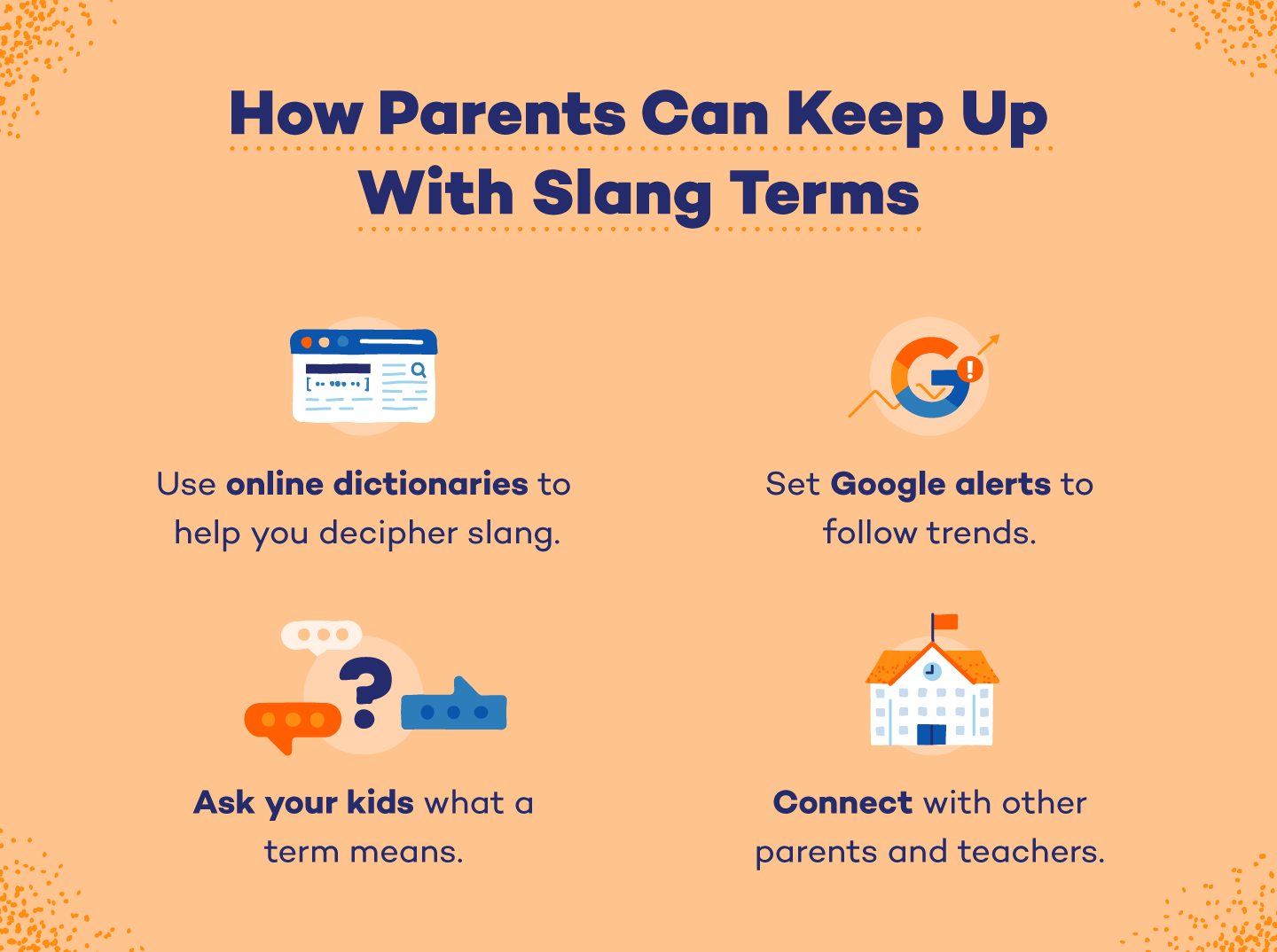
Internet Slang FAQ
It might not take much to know what TBH means, but parents have a lot to catch up on if they want to keep their teenagers safe. Here are some frequently asked questions about TBH and internet slang.
What Does TBH Stand For?
TBH stands for “to be honest.” It’s a very common slang term or abbreviation that teens and young adults use online in texting, social media posts and even in-person conversations.
Where Does TBH Originate?
No one knows for sure where TBH came from, but it likely stemmed from social media growth over the years. It’s a common term that has been used since the early social media days, around 2006.
Is TBH a Slang Term Used in Cyberbullying?
TBH isn’t necessarily a cyberbullying term, as it can be used in positive, friendly and uplifting contexts. However, abbreviations and slang terms are an essential part of young adult communication, and the term can be used in negative contexts as well.
The internet plays a different role in the lives of young adults and teenagers than it did for the previous generation. The digital world can be a dangerous place for the most seasoned and veteran internet users, let alone impressionable young people. That’s why it’s important to leverage all the tools available, including trusted antivirus software, to make sure they are safe and secure while browsing the internet.






1 comment
Parents, if you ever see your child discussing “Hello kitty” or specifically WATCHING “hello kitty” you need to have a conversation with them. My son told me what it means. I am not going to define it, but I will tell you it has something to do with the female anatomy..